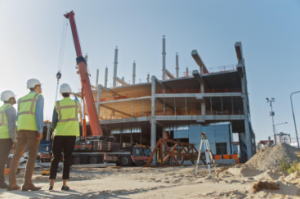Construction Defect and Mediation. Can you mediate a case too early?
Tue, Aug 25th, 2020 | by Miles Mediation and Arbitration | Article | Social Share
By Nigel Wright, Mediator & Arbitrator

Construction defect claims are often resolved in mediation, frequently because it is a convenient forum in which to gather all of the interested parties to address liability, quantum, insurance coverage, and apportionment.
A typical Construction defect claim is likely to have a minimum of 3 parties (plaintiff -whose property has been impacted, General Contractor and one, or more, sub–contractors/architect or engineer). However, with broadly drafted pleadings, policy coverage issues, and very often a significant amount at stake, the number of parties involved in the dispute can multiply rapidly.
The proliferation of parties and potentially impacted insurance policies, including excess carriers, makes co-ordination a major challenge. Attempts to resolve too quickly and the parties may not have sufficient facts to resolve the dispute, settle too late and the costs involved may already have made the litigation uneconomic from all sides` perspective. In addition, defence attorneys fear that if they raise mediation or settlement first then their clients will be seen as weak and be targeted as the party responsible. Better to keep quiet and hope the plaintiffs focus on the other parties?
In addition, given the number of parties and insurers involved in any given dispute, issues of forum become critical. For example, California has joint and several liability for tort claims, whereas Georgia allows apportionment of liability. Issues of cover and duties to defend, let alone indemnify, may differ between jurisdictions, and the claimed torts or contractual breaches may have a choice of law issues that the parties believe cannot be resolved at an early stage.
Not every construction defect claim involves all these issues, however, getting agreement for an early mediation is challenging and large-scale disputes can be litigated for years before the parties consider they are ripe for resolution.
Does it have to be this way? Like all good questions, it depends on what you are trying to achieve. Many construction defect claims are only settled after a ‘failed’ mediation, often at the second or even third attempt. If this is the case then why even try and settle early?

One way to look at early mediation in construction defect claims is that they can act as an effective case management and early discovery conference, with the added benefit that all parties are likely to learn something about their case that they may not have done beforehand and which may have taken many additional months of litigation to find out. In addition,
an early mediation will likely crystalize insurance coverage positions including primary and excess conflicts, and whether the parties are truly interested in settlement before the significant costs of litigation are incurred. Additional at-fault parties may be identified through the early mediation process. The late addition of such parties to ongoing litigation, which is often accompanied by coverage issues, merely delays resolution of the claim and leads to increased costs and expense for all. In multi-party disputes, the plaintiffs may well want to use mediation to let out, or settle out, a number of the parties as continuation against parties with viable defenses may damage their case. Equally, cross liability and indemnity claims can be addressed earlier in the process, through mediation, narrowing the issues as between defendants and streamlining the overall management of the case.
Using early mediation incentivizes defense counsel to assess their exposure and to start focusing on any disagreement about quantum. This enables all parties to better articulate the reasons for the disagreement and establish clarity about positions adopted, which is something that should always be encouraged as it leads to resolution. Only once the parties gain a more complete understanding of each of the participants` risks in terms of liability, quantum and coverage is it likely that a case will settle.
ABOUT NIGEL WRIGHT

As a mediator and arbitrator at Miles, Nigel Wright handles extensive personal injury claims in disputes in over 50 countries and complex claims (including class actions) for A&H, Aviation, Casualty, Commercial Property, Construction defect, Crisis Management, Cybersecurity, D&O, E&O, Energy and Marine, Environmental, Financial Lines, Insurance coverage, IP, Pharma, Product defect, Professional Liability, Political Risk, and Surety.

